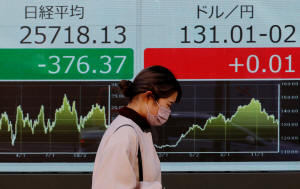Luxury sector lifts European shares as markets await U.S. CPI test
 Send a link to a friend
Send a link to a friend
 [August 10, 2023] By
Samuel Indyk and Ankur Banerjee [August 10, 2023] By
Samuel Indyk and Ankur Banerjee
LONDON (Reuters) - European stock markets rose on Thursday, helped by
gains in luxury brands after China eased some pandemic-era restrictions,
while the dollar slipped ahead of U.S. inflation data that could
influence the Federal Reserve's policy path.
Economists polled by Reuters expect July U.S. consumer price inflation
to rise slightly to an annual 3.3%, while the core rate, which excludes
the volatile food and energy segments, is forecast to rise 0.2% in July,
for an annual gain of 4.8%.
"We're going to see our first rise in headline inflation after 12
consecutive months of falling prices," said Ben Laidler, global markets
strategist at eToro.
"It will be a test of the goldilocks narrative which has supported the
rally, which is that inflation will come down and allow interest rates
to fall," Laidler added.
Markets are pricing in a more than 50% chance that the Fed is done with
interest rate hikes this year, the CME FedWatch tool shows, as inflation
moderates and the prospect of a soft landing increases.

The pan-European benchmark STOXX 600 rose 0.6% in early European trade,
supported by gains in the luxury sector after China lifted a ban on
group tours in the United States and other key markets.
Winners included LVMH, which rose 2%.
France's CAC 40 - which has a high weighting of luxury names -
outperformed in Europe, rising 1.1%, while Germany's DAX gained 0.5% and
Britain's FTSE 100 was up just 0.1%, weighed by a number of large-cap
companies going ex-dividend.
CHINA WOES
Asian stocks remained pinned near a two-week low, still reeling from
China's slip into deflation and an announcement of a U.S. ban on
investments in China in sensitive technologies like computer chips.
MSCI's broadest index of Asia-Pacific shares outside Japan was last down
0.1% and looked set to log a second straight week of losses. A
technology sub-index fell to its lowest in over two months.
Chinese data on Wednesday showed deflation at the consumer-price level
and further declines for factory-gate prices in July, exacerbating
concerns about the sputtering nature of the post-pandemic recovery.
China is the first G20 economy to report a year-on-year decline in
consumer prices since Japan's last negative headline CPI reading in
August 2021.
[to top of second column] |

A woman walks past an electric board
showing Nikkei index and exchange rate between Japanese Yen and U.S.
dollar outside a brokerage at a business district in Tokyo, Japan
January 4, 2023. REUTERS/Kim Kyung-Hoon

It highlights "the need for more fiscal support, if Beijing wants to
avoid the prospect of a deflationary trap," said Rodrigo Catril,
senior currency strategist at National Australia Bank.
In currency markets, the dollar index, which measures the U.S.
currency against six peers, eased 0.3%. The Japanese yen weakened to
a one month low of 144.135 per dollar, heading closer to the
psychologically key 145 level.
Meanwhile, the yield on 10-year Treasury notes was little changed at
4.0127%, having dipped on Wednesday after a well-received 10-year
note auction, with markets on edge due to a heavy bond supply over
the coming quarter.
"We've got $1 trillion coming down the pipe over the next three
months," eToro's Laidler said.
"Any sign that markets are absorbing that well, which we got the
first signs of yesterday, will be very well taken."
Bond strategists polled by Reuters expect U.S. Treasury yields to
fall in the coming months, with the median forecast for the 10-year
Treasury note yield at 3.60% in six months.
Oil prices rose to their highest since November 2022, continuing to
benefit from extensions to output cuts by Saudi Arabia and Russia.
U.S. crude was last up 0.3% to $84.61 per barrel and Brent was at
$87.82, up 0.3% on the day. [O/R]
Eyes were also on European gas prices after they jumped as much as
35% on Wednesday, hitting their highest level since June 15 after
news of possible strikes at Australian liquefied natural gas (LNG)
facilities sparked concerns over cargoes moving to Asia.

On Thursday, the front-month Dutch contract was down 12% to 37 euros
per megawatt hour, trimming around half of the previous day's gain.
(Reporting by Samuel Indyk and Ankur Banerjee; Editing by Edwina
Gibbs, Sam Holmes and Susan Fenton)
[© 2023 Thomson Reuters. All rights
reserved.]
This material may not be published,
broadcast, rewritten or redistributed.
Thompson Reuters is solely responsible for this content. |